WE WANT YOUR STORIES!
One of the best ways to talk about history is to tell the story. Did your parents or grandparents hand down a story about early Visalia? Did they come by wagon or train? Did they live in an historic building? Maybe you have a story about eating in The Depot Restaurant. Or perhaps you have a Visalia story that happened somewhere in between.
We’re starting to collect those stories. If you think your story could be included in Visalia’s history stories on our website, email it to Alison Miniaci, miniacali@yahoo.com or Donna Orozco, dorozco1115@yahoo.com.
VISALIA FREE LIBRARY
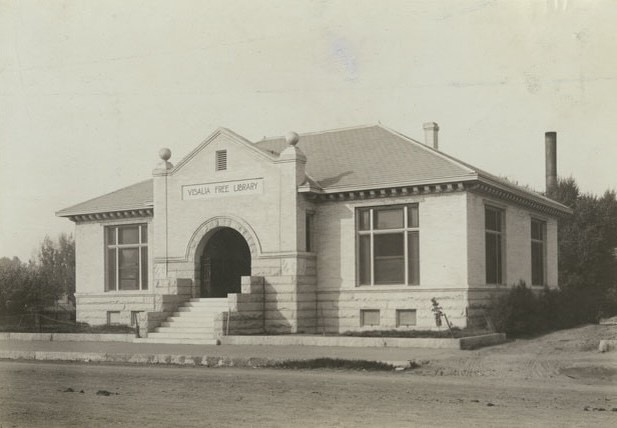
Before Visalia’s current library, there was the Visalia Free Library at the northeast corner of North Encina Street and West Main Street. It was built in 1904 with a grant from Gilded Age robber baron turned philanthropist Andrew Carnegie. Carnegie believed that free access to knowledge and learning strengthened communities, and his library grants helped towns build public libraries when many had none. Local leaders also committed to ongoing support, ensuring these libraries served the public for years to come.
The Visalia Free Library served the community until it was outgrown and demolished in 1936. While Visalia’s Carnegie-era building is gone, several nearby communities still have their original Carnegie libraries, including Exeter (now a community building) and Orosi, where the original Carnegie structure continues to operate as a branch of the Tulare County Library system.
MRS. SPALDING’S ELECTRIC CAR
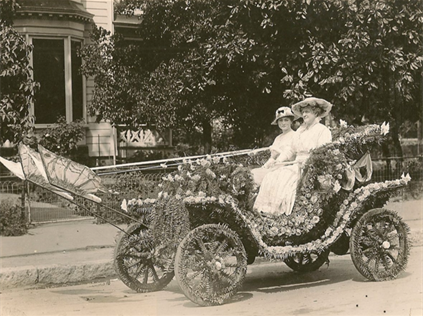
In 1904 a carriage building was constructed adjacent to the home, and complete with tack room, served as a stable for their horses and buggies. Later it was converted into a garage for their automobiles, which probably included Mr. Spalding’s Reo Roadmaster and Mrs. Spalding’s Baker, reportedly Visalia’s first electric car. Later the carriage building was made into a house with an address of 208 W. Grove Avenue.
TICKET TO RIDE
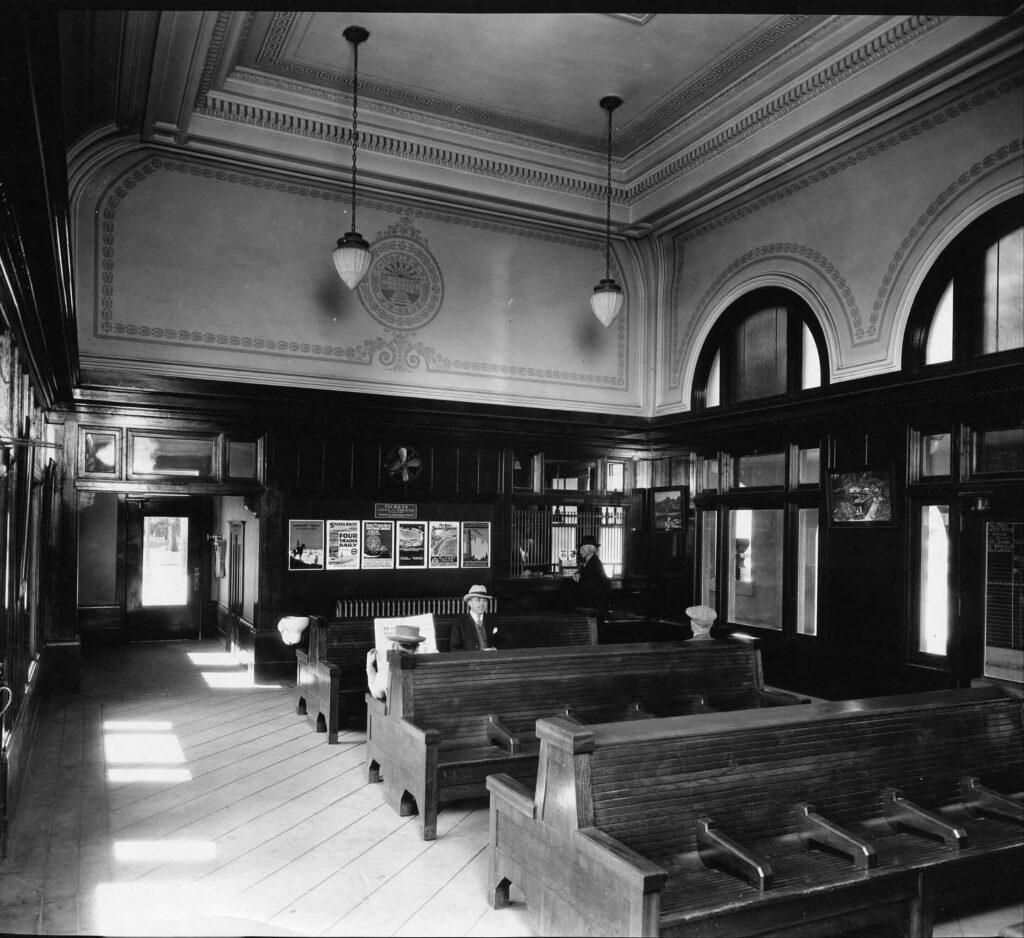
Step back in time to 1916!
This amazing photo shows the original waiting room of Visalia’s 1916 Southern Pacific Depot — complete with:
Original wooden benches
The ticket master’s cage
Milk glass pendant lighting
Hand-stenciled detailing featuring the Southern Pacific Railroad log
Period travel posters on the walls
William R. Spalding, a prominent Visalia lumberman, purchased the first ticket at the Southern Pacific Depot when it opened in September 1916. He bought a round-trip ticket to San Francisco.
Look closely and you’ll see a few men in the photo. Can anyone help identify them? It might be a long shot after a century, but we’d love to know!
Visalia Heritage is working to restore this historic depot and transform it into Visalia’s History Museum and Cultural Center.
VISALIA’S ORIGINAL SOUTHERN PACIFIC RAILROAD DEPOT
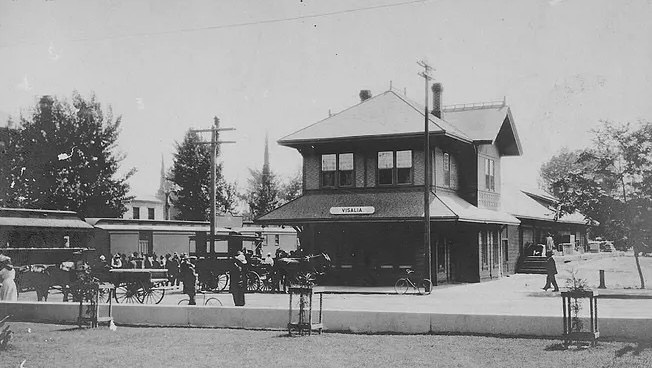
Here’s a rare look at Visalia’s original Southern Pacific Railroad Depot — a wood-frame, Victorian-era structure that once stood exactly where the 1916 Depot stands today.
As Visalia grew, this Depot was deemed too small. To make way for the new 1916 building, it was moved one block east, where it continued serving the community as a freight depot for several years.
In the lower portion of the photo, you can also spot original granite curbing — a historic feature that still surrounds our original courthouse square.
The horse-drawn buggies and waiting passengers remind us how central the railroad was to daily life in early Visalia. Though this building is gone, its story remains a key chapter in our city’s past.
Visalia Heritage is working to restore the 1916 Depot and create Visalia’s Museum and Cultural Center.
“All aboard, Visalia!”
WHERE IS IT NOW?
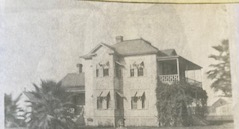
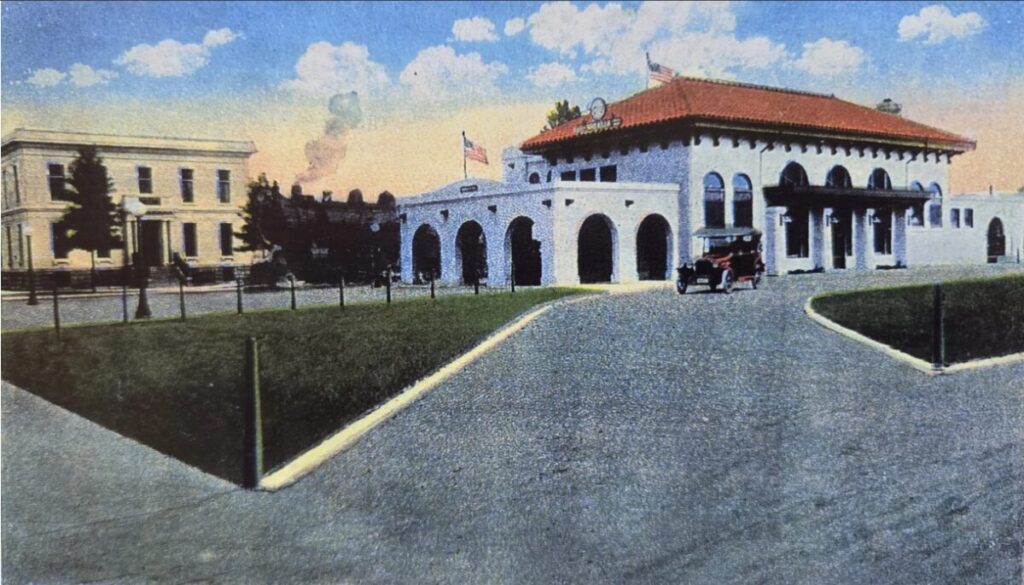
The Depot First Dedicated on Fourth of July, 1916
Visalia Morning Delta July 4, 1916 The formal dedication of Visalia’s new Southern Pacific depot will take place this evening at 8 p.m. with B.M Maddox of Visalia [newspaper publisher and Mt. Whitney Power Company] representing the city and H.R. Judah, assistant general passenger agent, at hand for the railroad company. During the exercises the depot will be in total darkness while the Visalia band plays several selections. The first ticket will be sold to Jas T. Boyer of the Visalia Board of Trades. According to Agent Lary, the ticket will be from Visalia to New York and return, Mr. Lary insisting that Mr. Boyer return. The hour of 8 o’clock has been selected as the most appropriate, the lighting effect of the depot being quite elaborate. Visalia will readily respond to this dedication as the depot is now a reality, and they appreciate it as one of the finest in the valley. When the parking is completed and the paving done, the structure will show up even larger and more auspicious that it does now. A separate story told about the elaborate Fourth of July activities planned: The headline said rooming houses and hotels were crowded to the limit. The day would begin at 9 a.m. with the Visalia band playing. There would be a baseball game against the Bakersfield Elks and patriotic activities in the new auditorium (the Visalia Municipal Auditorium on the northwest corner of Acequia and Garden, which would be dedicated at a later date, so as not to detract from the depot opening). There would be a carnival on Center St. and a 150-mile road race with a purse of $1,800. There were 14 entries. The day would also celebrate the completion of the new state highway between Hanford and Visalia. Hanford was going to close down almost entirely so those from Hanford could come to Visalia and hold a twin-city celebration. Then there would be another band concert in the business section, the official opening of the depot, and a dance in the new auditorium. The newspaper called it “one of the best Fourth of July programs in years, despite the militia boys going away.” |
